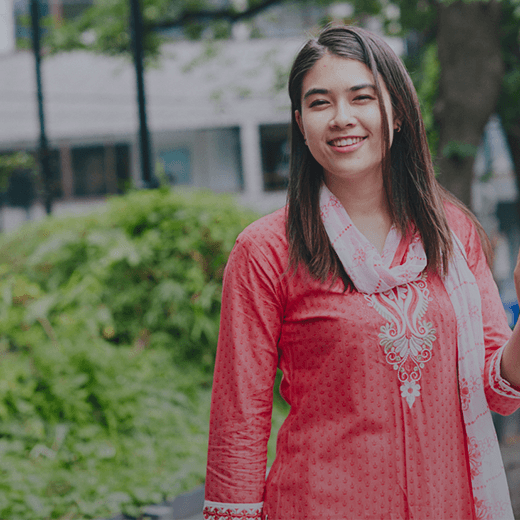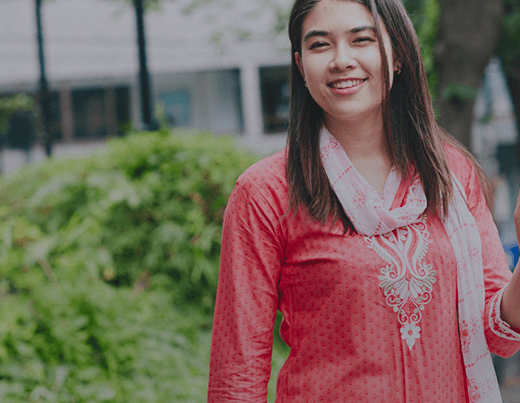As a director of the American NGO “InternetBar.org”, Yasuda is developing a “Digital Identity” business aiming to issue digital certificates for refugees in Bangladesh, while belonging to a major IT company. His career is glamorous with a modern global elite, but it’s not the essence of her.
A specialty project that selects 30 people under the age of 30 with a vision and talent representing Japan 30 UNDER 30 JAPAN 2019 What is the future image drawn by Yasuda who won the politics category of ──.
Born in Russia and raised in Hokkaido
Yasuda’s life has been global since she was born. Born in St. Petersburg, Russia. Born in 1995 between a Japanese father who was doing business in Russia and a mother born in the former Soviet Union, he came to Japan at the age of four and a half. In the midst of the turmoil caused by the collapse of the Soviet Union, his father decided to return to his home country of Japan. She is “thankful” for the decision that cultivated her global sense.
The family, originally from Tokyo, soon moved to Sapporo. For his father, Sapporo was an area where trading business with Russia and the former Soviet Union was easier. Most of the conversations between families at home are in Russian. I used Japanese at school and learned English from an early age, so I was able to read and write in three languages to the same degree.
“I had never worried about my identity when I was a kid in Japan. Self-awareness is completely Japanese. By the middle 1 I could speak English almost natively, which was a great strength. Instead, they looked at me as if they were half-cool.”
Laugh when the characters that appear are different depending on the language you speak. Russian speaks more aggressively, English speaks clearly from the conclusion, and Japanese doesn’t say everything and values line spacing. The behavioral patterns are skillfully changed according to the person to talk with.
From the second year of elementary school, I attended a Russian school in Japan after class and learned Russian in the form of W school as well as at home. In junior high school, I also took classes in English such as English and biology.
The broadening of her language skills prompted her to look not only at home but also outside. From high school, the choice of university destinations was inevitably expanded overseas. The final choice was the Paris Academy of Political Science. Yasuda, who was interested in environmental issues in science when he was in high school, was thinking about going on to study in Japan. However, as a result of talking to science researchers, I realize that political power is more important than technology for solving global problems.
“In the end, politics will decide which research to allocate the money to, so I thought it would be better not to be a researcher myself but to go to the side that creates the system. I was looking for an overseas university to study,”
Translated from Japanese:
安田は、大手IT企業に属しながらも、アメリカNGO「InternetBar.org」の理事として、バングラデシュを舞台に難民のために電子証明書の発行を目指す「デジタル・アイデンティティ」事業を展開する。経歴を見ると、現代らしいグローバルエリートで華やかだが、彼女を表す本質はそこではないだろう。
日本を代表するビジョンや才能の持ち主30歳未満の30人を選出する名物企画「30 UNDER 30 JAPAN 2019」のポリティクス部門を受賞した安田の描く未来像とは──。
ロシア生まれ、北海道育ち
安田の人生は生まれた時からグローバルだった。ロシア・サンクトペテルブルク出身。ロシアを舞台にビジネスを展開していた日本人の父親と旧ソ連生まれの母親との間に1995年に生まれ、4歳半で日本にやってきた。ソ連崩壊で混乱が続く中、父親が母国である日本への帰国を決めた。彼女のグローバルな感覚を養うことになったその決定を彼女は「感謝している」という。
最初は東京にいた一家は、まもなくして札幌へと引っ越す。父親にとって札幌はロシア、旧ソ連圏との貿易ビジネスがよりやりやすいエリアだった。家庭内での家族同士の会話はロシア語が中心。学校では日本語を使い、幼少期から英語も習っていたため、3言語の読み書きが同程度にできた。
「日本にいた幼少期にアイデンティティで悩んだことはなかったです。自己認識は完全に日本人ですね。中1までに英語はほとんどネイティブ並みに話すことができてこれがすごい強みになった。同級生たちはむしろ、ハーフかっこいいじゃんみたいな目で見てくれた」
話す言語によって、出てくるキャラクターが違うと笑う。ロシア語の時はよりアグレッシブに、英語は結論からはっきりと話し、日本語ではすべてを言い切ることはせずに行間を大事する。話す相手に合わせて、巧みに行動様式も変化させるのだ。
小学2年生ごろからは授業後に在日ロシア学校にも通い、家庭内にとどまらずWスクールという形でロシア語を習得した。中学時代には、英語や生物などもロシア語で授業を受けた。
語学の幅を広げたことが、彼女を国内だけでなく、より外の世界へと目を向けさせる契機になった。高校時代から大学の進学先の選択肢も必然的に、海外まで広げていた。最終的に選んだのは、パリ政治学院だった。高校時代に理系で、環境問題に関心があった安田は国内の進学も考えていた。だが、理系の研究者に話を聞いて回った結果、グローバルな課題解決には技術以上に政治の力が重要であると思い知ることになる。
「どの研究にお金を配分するか、結局は政治が決めていくこと。だったら、自分が研究者になるんじゃなくて、仕組みを作る側に回ればいいと思ったんです。せっかくグローバルな政治課題を勉強するなら、海外の大学がいいかなと思って探しました」




